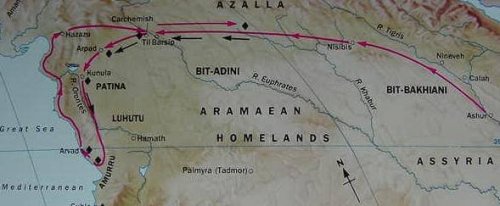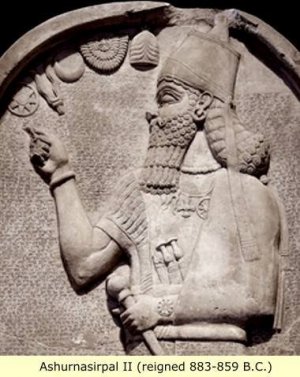By: Hanna Hajjar

Note: In this book of Dionysius Bar Salibi Bishop of Amed, Suros is named Asuros
Note: The quote is from the book ‘Kthobo d Orughutho’ Refutations of Dionysius Bar Salibi against the Melkites "Melkoye or Yaunoye" by Kashisho Skender Kilic
According to Mor Dionysius Bar Salibi Bishop of Amed, Syria gots its name from a king called Asyros. Later according to Patriarch Mor Mikhael Rabo that Syria got its name from a king called Syros.
Is there a contradiction or are they talking about the same King? And if so who was that king, and when did he live?
According to Gabriel Rabo he corrected Bar Salibi and said it should be Syros not Asyros. Well here is the problem with the twisted logic of Gabriel Rabo, without giving any logical reasons:
1. Gabriel Rabo is forgetting that Mor Dionysius Bar Salibi predates Patriarch Mor Mikhael Rabo, hence it was Mor Mikhael Rabo who copied from the writings of Mor Dionysius Bar Salibi. In other words logically it is the copier who is corrected and not the source, which means that it was Mor Mikhael Rabo who dropped the Olaf from the beginning of the name Asuros. This makes us conclude that Asuros (or Asyros) is the correct name and Suros (or Syros) is the modified name.
2. Obviously Gabriel Rabo’s quest is not academic or scholarly, but rather a propaganda one, because he is allergic to anything Assyrian including Assyrian names.
3. Now let's take a closer look at the name of the King Asuros, at first glance we notice that it is ending with "os" so obviously it is a Hellenic Greek name, or a foreign name that was Hellenized by adding the "os" suffix for masculine names.
4. If we search Greek names we see that Asuros is not a Greek name, hence it is a foreign non Greek name.
5. Therefore to get the original foreign name we need to remove the Greek “os” suffix form Asuros. And after removing the “os” we get “Asur”. We all know that Greek doesn’t have the letter “sh” (Sheen), so the Hellenized Asur, must be coming from “Ashur”.
6. And guess what nation has a ton of names that use Ashur? Obviously it is Assyria. Therefore the king Asuros who gave his name to Syria is actually an Assyrian king called Ashur, which in order to Hellenize this name it goes through two steps:
a. First the “sh” is changed to “s”, turning “Ashur” into “Asur”.
b. Second a masculine ‘os” suffix is added, turning “Asur” into “Asuros”.
7. And Asuros is the Hellenized Greek name of Ashur that Mor Dionysius Bar Salibi wrote in his book, and later Patriarch Mor Mikhael Rabo modified it by dropping the “A” (Olaf) from its beginning, which a common practice in Syriac. So in essence Mor Mikhael Rabo didn’t intentionally drop the “A” (as the case with Gabriel Rabo) but rather because it was a common practice amongst our people.
8. Definitely Asuros wasn’t one of the Seleucid Kings simply because his name is not on their list of kings who ruled Syria. Additionally the name Syria was in use by the Greeks before the Seleucid time so this Asuros king is older in time.
9. Prior to the arrival of the Greeks to the Middle East, it was ruled by the Persians, and they called the upper Middle East as Athura (also derived from Ashur or Assyria). however none of the Persian kings were called Asuros. Although one was called Cyrus, but in Persian and Syriac his name was Qurosh, while Cyrus was a name given to him by the later Greeks and Romans. This is why many people get confused and assume that Syrus is Cyrus, but those are two different men.
10. Prior to the Persians, the Chaldeans ruled the Middle East, and none of their kings were called Asuros.
11. As to the Medes, they didn’t rule the Middle East, and none of their kings were called Asuros.
12. Finally we arrive to the Assyrians, and we see that most of their kings had Ashur as part of their names. Example: Ashur-Dan, Ashur-Nirari, Ashur-Banipal, Ashur-Nasirpal. And that Ashur in their names was turned into Asuros.
13. Now that we found the source of the name we need to narrow it to which king? Logically we can narrow it to the Assyrian kings who conquered the Levant, (i.e. those Assyrian kings who crossed the Euphrates River and entered the Levant, hence giving their name to Syria.
14. The first Assyrian king who crossed the Euphrates River 850 BC was Ashurnasirpal II (Ashur-Nasir-Pal), who ruled 883-859 BC, (See the map below of his venture in the Levant). And it was him who gave Syria its name. (i.e. Ashurnasirpal became to be known as Asuros, and later Suros, and Syria was named after him.


15. Notice that the Greeks called Syria the whole Middle East, and not just the Levant, what this means is that to the Greeks Syria was associated with Assyria. Because if it were another king running only the Levant region, then the Greeks would have named only the Levant as Syria, but they didn’t, and that is the clue that proves that the name Syria was associated with Assyria. And derived from Assyria, and specifically from the name of the Assyrian king Ashur-Nasir-Pal II. Who was known as King Asuros to Mor Dionysius Bar Salibi (see page 734 of his book), and as Suros to Patriarch Mor Mikhael Rabo.
16. Another proof that supports my point is the Greek translation of the Bible, where we see, Genesis 10:22, The children of Shem; Elam, and Ashshur, and Arphaxad, and Lud, and Aram. translated to Greek as: υἱοὶ Σημ Αιλαμ καὶ Ασσουρ καὶ Αρφαξαδ καὶ Λουδ καὶ Αραμ καὶ Καιναν
Notice that "Ashur" was written as "Ασσουρ" ("Assur") is spelled out as (Alpha, Sigma, Sigma, Omicron, Upsilon, Rho). and that corresponds to "Asuros" as mentioned by Mor Dionysius Bar Salibi. Noting that in Syriac depending on which dialect you are using certain letters are doubled. Example: "Gaboro" in western dialect corresponds to "Gabbara" in eastern dialect (where the "b" is doubled). And that is where the double "ss" vs. one "s" come from (it is the dialect), in Assuros or Asuros.
Noting that Assuros, Asuros, Asurus, Asoros, Asorus, Asourous etc. are all identical, and derived from Ashur, since it is very common to see Greek names transliterated with either "o", "u", or "ou".
And this is where Syria got its name from!






